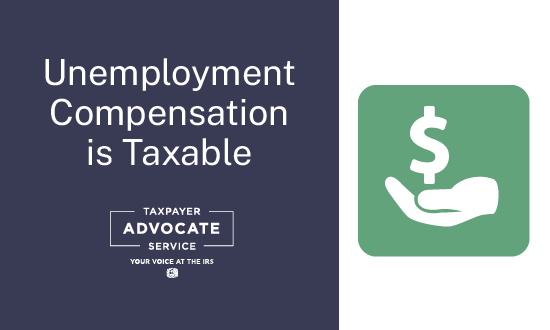If you are receiving unemployment benefits, the benefits are taxable. Do you know you can have tax withheld so you may not owe when you file your tax return next year?
How this may affect you
- If you receive unemployment compensation this year, you must report it on your tax return.
- Tax is not withheld automatically from unemployment benefits.
- Even if you have returned to work, you may not have enough tax withheld between now and the end of the year to cover the tax due on your unemployment compensation.
- If you don’t have enough tax withheld, you may also have to pay penalties and interest.
- Unemployment compensation is considered unearned income, so it doesn’t count when calculating the Earned Income Tax Credit (EITC). This means your EITC may be less than you expect, depending on how much unemployment compensation you receive.
What you can do now so you won’t owe at tax time
- If you currently receive unemployment compensation, you may choose to have a flat ten percent withheld from your unemployment benefits to cover part or all of your tax liability.
- You should contact the agency paying you benefits to see if it has its own form you need to fill out for voluntary withholding. If not, you should fill out Form W-4V, Voluntary Withholding Request, and give it to that agency. Don’t send it to the IRS.
- If you were unemployed but have returned to work, you may increase the tax withheld on your paychecks or make estimated tax payments. The estimated tax payment for the first two quarters of 2020 was due on July 15. The third quarter payment was due on September 15, 2020, and the fourth quarter payment is due on January 15, 2021. More information is available here.
Other things you should know
- If you receive unemployment benefits in 2020, you should receive a Form 1099-G, Certain Government Payments, in late January or early February 2021.
- You can find the amount of unemployment compensation you received in 2020 in Box 1 of the form. Be sure to report this income on your 2020 tax return.
- You can find the amount of tax withheld in Box 4 of the form. Be sure to claim this withholding on your 2020 tax return, along with any tax withheld from your paycheck or any other sources.
- If you have too much tax withheld, you may either request a refund on your 2020 tax return or have it applied to 2021 taxes. The choice is yours.
Taxpayer Advocate Service Help
Currently, the Taxpayer Advocate Service (TAS) is open to virtually serve taxpayers who find themselves in hardship situations or dealing with IRS tax problems they’ve been unable to resolve directly with the IRS. Visit our Contact Us page to see who qualifies for TAS assistance. We will also be posting updated operational status information there as well.
Follow the Taxpayer Advocate Service across social media: Twitter, Facebook, LinkedIn and YouTube.
More Resources:

